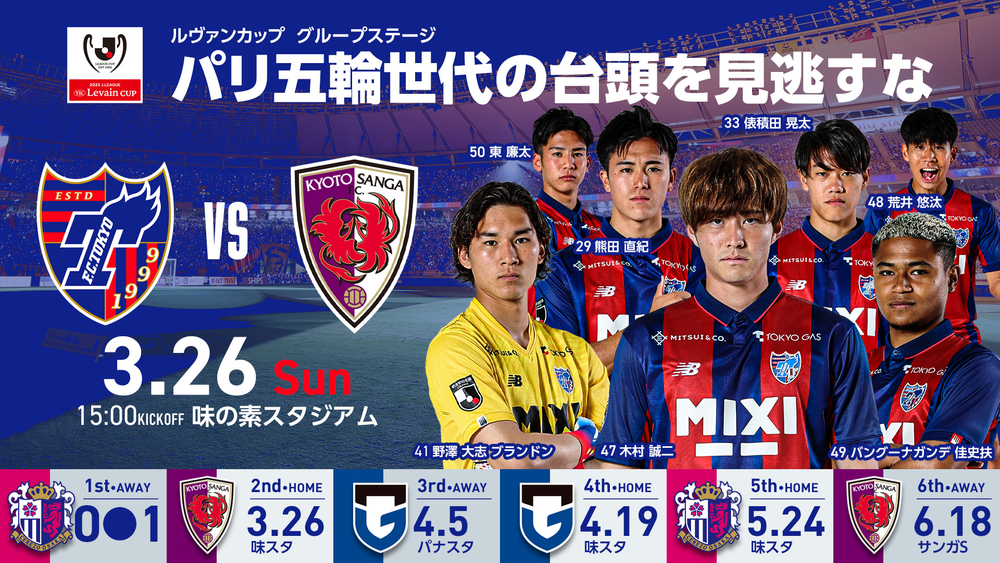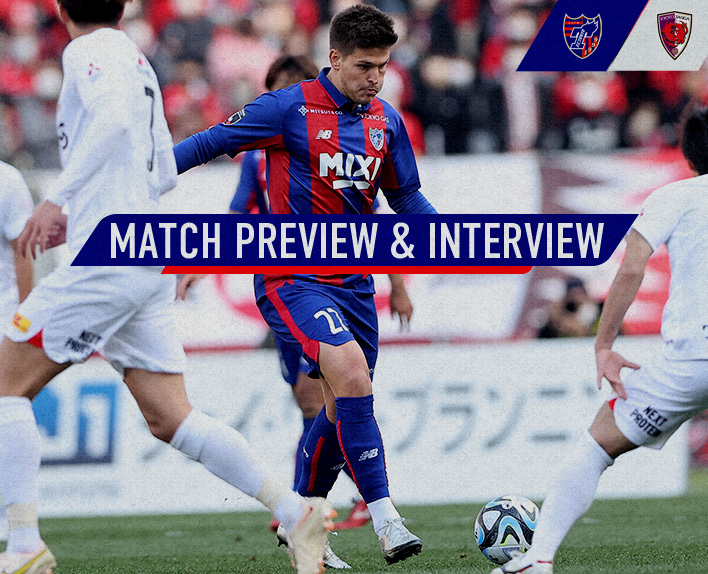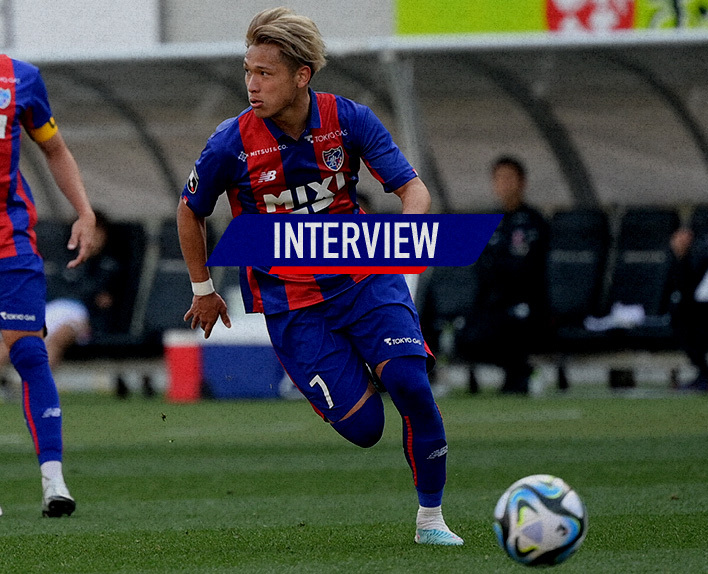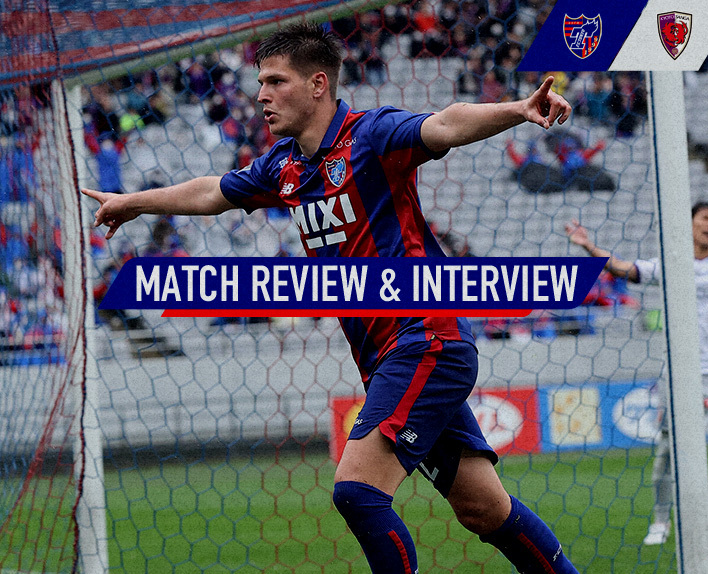<Match Preview>
In the first match of the Levain Cup group stage, Cerezo Osaka suffered a 0-1 defeat. Despite the loss, many young players, including Ryunosuke SATO from FC Tokyo U-18, had the opportunity to play. 16-year-old Ryunosuke SATO reflected positively after the game, saying, "The 60 minutes I played were the most intense time of my life. I want to build on this for the next game."
The second match will welcome Kyoto Sanga F.C. to the home ground. The team, led by coach CHO Kwi Jae, plays a style of soccer that emphasizes high pressing and strength in ball battles. In addition, the height of players such as Kosuke KINOSHITA and PATRIC adds to their strength. In the league match, they defeated Tokyo in the third round and went on to win three consecutive games. For Tokyo, this will be a chance to take revenge.
Kuryu MATSUKI and Naoki KUMATA, who participated in the U-20 Asia Cup as members of the U-20 Japan national team, have returned to the team. Expectations are high for KUMATA, who became the top scorer of the U-20 Asia Cup with 5 goals, to make his first official appearance as a professional player. As MATSUKI says, "If we can lead the young players, the team will become stronger," the success of the young players will surely contribute to the improvement of the team. In order to gain momentum for the consecutive matches starting in April, the players will go for victory with their dynamic soccer.
Matchday Program here
[Albert PUIG ORTONEDA Interview]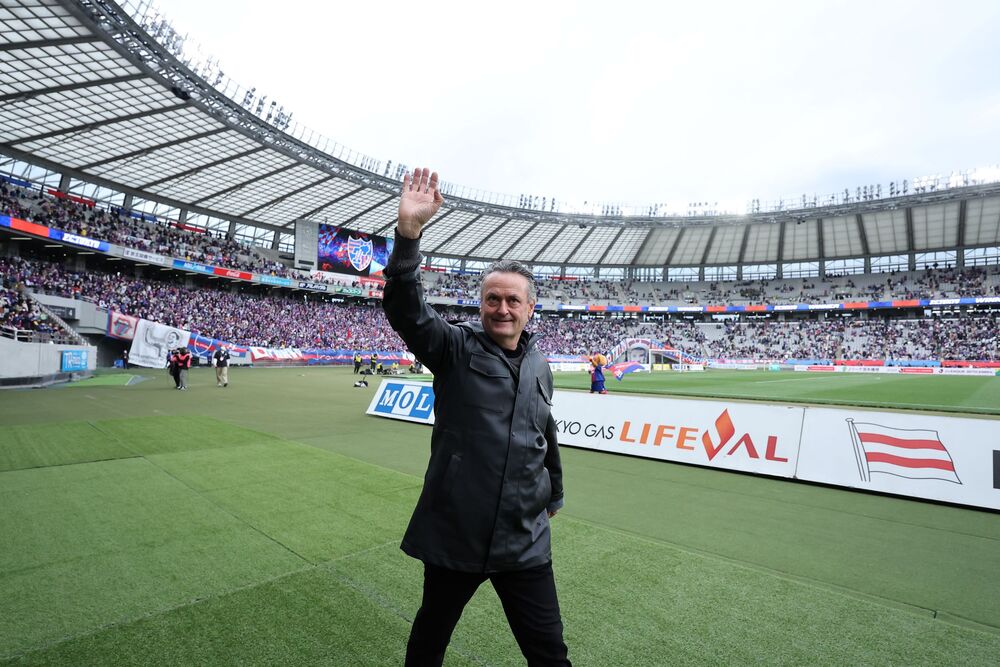
Q: There is one week until the next league match, and I think there is plenty of time. Who will you welcome with tomorrow?
A, not only players with few opportunities to play, but also players who are participating in the league will join in multiple forms. I want to give some players a rest. Other players are ready to play after a week of preparation, so I think there will be players who will play. I want to continue giving young players opportunities, and I want to continue that this time as well. Whether it's starting or coming off the bench, I don't know, but I want to give young players a chance.
Q: Is it your belief that players who have participated in league matches should also be utilized, considering their condition?
A, there are parts that are like that and parts that are not. What you need to keep in mind is that there is a dense schedule in April. This season, there is a period of dense schedule, but there are also times when the number of matches is very small, and an irregular schedule is arranged. There are also weeks without matches in the summer. April has a dense schedule, so we considered that and selected this week's members.
Q: What do we need to do to advance to the next round?
Regarding the first match against Cerezo Osaka, I don't think the loss was deserved. At the very least, it should have been a draw. In every match, we always aim for victory. However, if we only focus on the match results, when will we be able to give opportunities to young players? To determine how much young players can grow and what they can achieve, it is necessary to let them play in official matches. As I mentioned before, I hope that the Levain Cup can establish rules that oblige the use of young players and become a cup competition where young players can shine.
Q: It is said that there is no difference between the world and Japan until the age of 18, but is the difference that opens up after those three years due to the difference in experience in official matches?
A, there are various stages of growth. I think it is most important to let them play freely until the age of 12. In that regard, I think Japan is functioning well. It is necessary for the junior youth generation in Japan to learn tactics in the academy over a period of three years. I also think Japan is moving in a good direction in that aspect.
The remaining challenge is the youth generation in the pre-professional stage. In order to develop high-level professional players, the youth and college age groups, as they are known in Japan, are crucial. The generation between 19 and 22 years old, I believe, will gain experience and grow through competition. For example, how much did Matsuki improve in the past season? I think he improved a lot. This is because he was able to play official matches and had to focus on winning. If Matsuki had not been given a chance, he would not have grown. On the other hand, in other countries, that generation is gaining experience and growing through high-level official matches. In terms of this aspect, I think there is room for improvement in Japan. Without improving in this area, it will be difficult to aim for even higher levels.
To aim for a higher level, it is important to accumulate difficult game experience in the generation of around 20 years old. Sometimes I think that great players like Mitsumata will come out, but in order for such great players to consistently emerge, fundamental reforms are necessary.
In soccer, it is said that the central player is important. Japan's level is still not high for positions such as goalkeeper, center back, defensive midfielder, and center forward. The reason why Japan's player pool is thin is because, for example, how many young center forwards do professional soccer club coaches want to use? I think there are few coaches who would use an 18-year-old goalkeeper in a league match. The same goes for a 17-year-old center back. It is difficult for any country to make the decision to use young players in central positions. However, in Japan, because young players are not being used in that zone, it becomes a vicious cycle where they do not develop easily.
Q: Is there a possibility that young players who have not had a chance to play so far will play tomorrow?
A, I want to give a chance tomorrow. However, chances are not given as gifts, they must be earned. I am not at all worried about using young players. However, when it comes to giving chances to any young player, they must prove that they have a high level and a strong mentality full of motivation. I am ready to cooperate to the maximum extent for young players to grow in the future. However, whether they can seize the opportunity depends on themselves.
Q: Kashif BANGNAGANDE has been selected for the Japan national team.
I hope that player Yoshifu will continue to grow. The level required as a member of the Japanese national team is very high. I think that his classmate, player Takefusa Kubo, has reached a fantastic level. My wish is for players Yoshifu, Hotaka Nakamura, Kuryu Matsuki, Takefusa Kubo, Naoki Kumata, Kota Tawaratsumida, to be included in the roster of the Japanese national team.
[Player Interview]
PEROTTI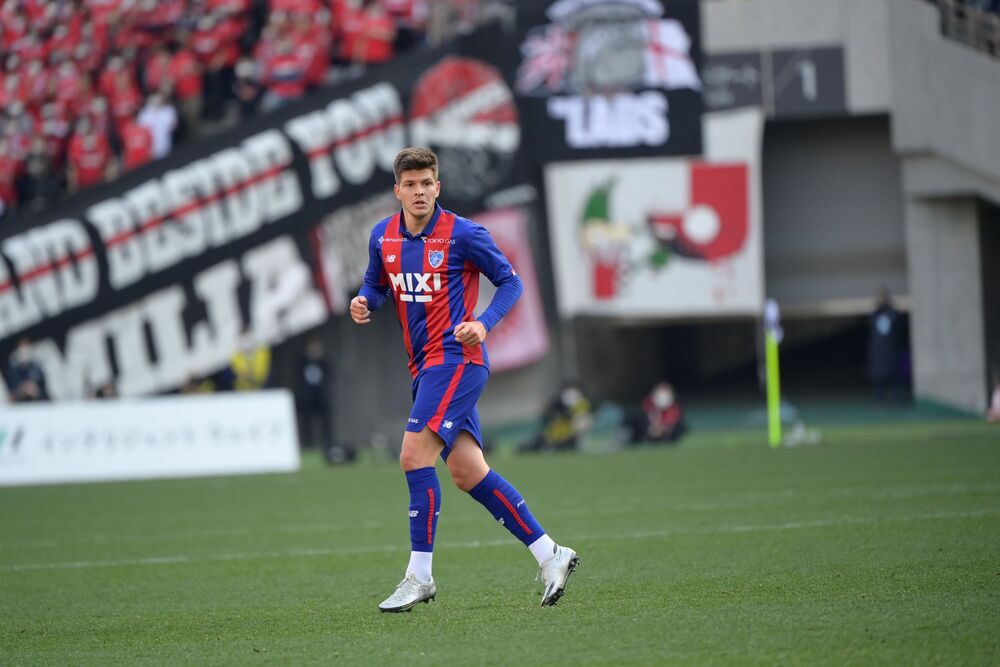
Q: Although there was hardly any playing time in the Nagoya match, did you feel any frustration?
I always have the desire to play in the matches. However, there are also game developments and the coach's strategies, so I understand that. Rather than feeling frustrated, I think it's inevitable. The style of Japanese soccer is different from the style I have played so far. I have only been in Japan for a short time and haven't played in many matches. Of course, I have to adapt, so I want to contribute to the team's victory by playing better from now on.
Q: I think you are always included in the substitute members in practice matches and league matches. Is it because you just joined the team and there are no problems yet, or do you think you need to score even in a short amount of time to secure a starting position? What do you think?
A, I am preparing to score regardless of the playing time. I believe it is my role to do my best during the playing time, whether it is 5 minutes or 90 minutes. As a forward, I always have the desire to score. However, scoring goals is not easy and I think it is not something that can be easily achieved. Currently, I haven't scored any goals, but there may be games where I can score 2 or 3 goals. I think this depends on the flow of the game.
Q: When you make a good shot during practice, the fans also get excited, but how do you feel about your own performance and condition?
A, I always think that what we do in practice leads to results in the game as goals. I want to have a good practice and prepare for the game. Of course, after today's practice, I am thinking of having an even better practice tomorrow. I have the desire to score goals, but even if goals don't come, I hope to contribute to the team in other ways.
Q: I often see you interacting not only with Brazilian players but also with Japanese players. I can feel your attitude of trying to blend into the team.
A, I don't understand Japanese very well, but since coming to Japan, my teammates and staff have warmly and kindly accepted me. I am grateful once again. Everyone comes to me on the pitch and cares about me. Since my time at Chapecoense, I have had the desire to lend my strength for others and the feeling of respecting others. I have been communicating with various people since a long time ago.
Q: Do you have any enjoyment you found after coming to Japan?
A, I have always had a desire to play in Japan. Among that, I was able to achieve my dreams and goals. I thought there would be difficult times coming to Japan, but the people of Japan, including the city, are truly wonderful. It is a place beyond what I had imagined. My wife is also enjoying life in Tokyo. I want to start from here and achieve my goals.
Q: Why did you want to come to Japan?
I had the opportunity to interact with players who have played in Japan and in 2017. Those players said that Japan is a very good country, including its culture, customs, and soccer. I also strongly felt the desire to visit such a country.
Q: What surprised you in Japan?
There are two things. The first is that I think Japanese children, around elementary school age, are cute. Also, I was very surprised to see 7-year-old elementary school children going to school by themselves, not with their parents. The second thing is the scramble crossing in Shibuya. In my city, there are not that many people. I was surprised to see so many people.
Q: Which city in Brazil is close to Tokyo?
A, in terms of being a big city, it would be São Paulo. However, it cannot be compared to Tokyo at all.
<Taishi Brandon NOZAWA>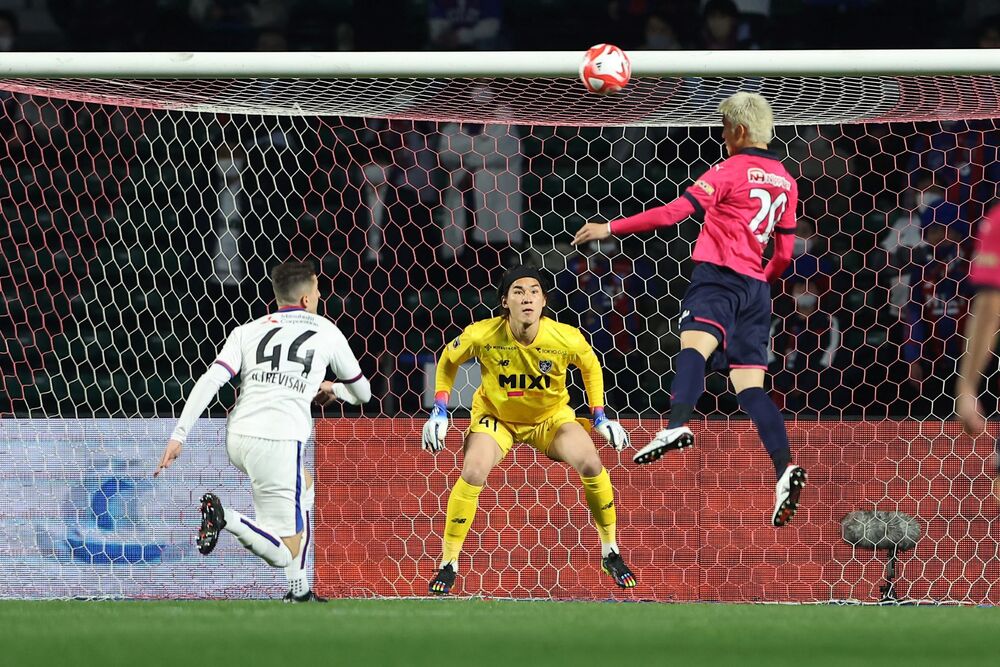
Q: You experienced a year and a half on loan at Iwate Grulla Morioka from the middle of the 2021 season. You have returned to Tokyo this season, so please tell us about your feelings up until now.
The A League has started and the Levain Cup has also had one match. Last season, I was watching Tokyo as a player from another team. Now, I am extremely happy and excited to be fighting as a member of Tokyo. Of course, I am not playing in the matches, but as a team, we are able to focus on winning every game and have daily practices. I think I am having very fulfilling days.
Q: What changes do you feel in Tokyo now compared to before you transferred?
Before transferring, Mr. Kenta HASEGAWA was the coach. I think there have been significant changes since last season when Albert PUIG ORTONEDA became the coach. What I am currently working on is a style that I have never done before. In Iwate, we played a different style of soccer than what Tokyo is aiming for now. Coming back to Tokyo, the goalkeeper is also actively involved in the attack, and when defending, how to concentrate and prevent a few pinches. There are many elements that I have never experienced before. It is a difficult task to adapt, but I feel a sense of fulfillment.
Q: Are you good at playing a play style that requires technical skills at the goalkeeper's feet?
A, I'm not good at it, but that doesn't mean I lack confidence. After all, the most important thing as a goalkeeper is to protect the goal. It is the responsibility that is most demanded, so I am working closely with the coach and the goalkeeper, but the most important element is to eliminate mistakes without taking risks. I don't think it's necessary to be really good at dribbling to fulfill that. I believe that as long as I can do the basic things naturally, there should be no problem.
Q: Please reflect on your experience of continuously standing on the pitch as the main goalkeeper for Iwate Grulla Morioka and also experiencing promotion from J3 to J2 over the course of one and a half years.
A, I think I have learned the responsibility of playing in matches. Of course, there are several goalkeepers in the team, and only one can play in the match. There are also sponsors, team staff, fans and supporters, and people in the local community who support Iwate Grulla Morioka. I have been thinking about playing in the matches as a representative for those who support and cheer for us.
Although I was allowed to participate in the game, I was made to realize that my behavior was not suitable for a player on the field. Therefore, I learned the responsibility of needing to do more, have more confidence, and have the courage to stand on the pitch in order to win for the team. That was the biggest thing for me.
After returning to Tokyo, I still need to grow technically, but at the same time, I have gained confidence by learning about responsibility. When I stand on the pitch now, I feel much more relaxed than before I transferred to Iwate, and I think I have become better at making calm decisions. In that sense, I am truly grateful for the year and a half I spent in Iwate.
Q: This season, I started in the Levain Cup match against Cerezo Osaka. We lost 0-1 due to a late goal, but I felt the impact and identified areas for improvement. How do you reflect on your performance?
A, just remembering it makes me feel frustrated and angry. For me, it was really important how to express myself in one of the few opportunities to play, so I feel angry that it ended with such a result.
If you really demand strictness from yourself, you have to win even in such a game. Looking at it calmly, I think we were able to do it until around the 86th minute. Of course, there were mistakes and things that the team could improve on, but until that time, we were pushing the opponent and playing under pressure. Personally, I think I was able to play calmly without panicking. So, I wasn't too pessimistic and was already switching to "next" mode.
Q: How do you feel about the situation where young players like Kashif BANGNAGANDE, who joined the Japan national team, Kuryu MATSUKI and Naoki KUMATA from the U-20 national team, Kota TAWARATSUMIDA in his first year as a professional player, and Yuta ARAI are attracting attention in Tokyo?
A, certainly Coach Albert Puig Ortoneda is a coach who greatly respects and allows young players to play. In Tokyo, there are many great players, and young players practice with them every day. In that sense, I think veteran players, experienced players, are becoming a presence that helps bring up young players well. Of course, it is also true that each young player has high ability. It is a happy thing for the team to have a future, but young players must understand that if they want to raise their own evaluation, it is difficult if the team's evaluation does not rise.
So, it's not about being young, but I think I need to think about what I can do for the team to win, and then work backwards from there. It's not just about being young, but even experienced players are always thinking about how to help the team win, so I want to make sure I don't cause any discrepancies in that mindset.
Q: Isn't it a pleasure for player Riku NOZAWA to see academy graduates performing well?
A, yes. It's a happy thing for the team and the fans/supporters, isn't it?
Q: Since there is only one position for a goalkeeper in the team, I think it is difficult to get a chance and make an appeal. What are your goals for this season and what do you plan to appeal?
A, as something that I am reminded of every day, it is important that each and every technique of the goalkeeper is good, of course. However, what is more important is to make the team win and to become a player who can give a sense of security. That is why I am thinking every day about what I can do to achieve that. I don't think it is something that I can achieve on my own, so I rely on various people. Not only my teammates, but also the goalkeeper coach, I listen to various stories. Since there are many amazing players, I am also curious about how they think. I want to cherish each day without wasting it.
Although I am not currently playing in the game as the first choice, I am thinking about what is important now in order to become a goalkeeper who leads Tokyo to victory when I eventually step onto the pitch. I am looking ahead, but if I could do it now, it would be the best. I always put this kind of pressure on myself in a positive way. I want to express the attitude of fighting until the end in this season.
Q: Finally, please share your enthusiasm for the Levain Cup Kyoto match with the supporters.
A,Of course, it's not a league match, but each and every one of us in the team is hungry for a title. We want to win from where we can win, and I personally feel that way. I want to motivate myself with that feeling and stand on the pitch with confidence. I really want the team to earn 3 points and gain momentum for the next league match, I want to have such a weekend. I'm looking forward to standing on the pitch at Ajinomoto Stadium myself.
